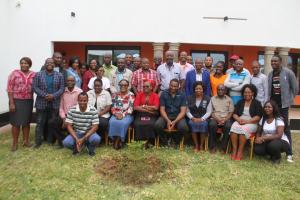WHO supports the Ministry of Health to train provincial and district health promotion officers in emergency risk communication
Zambia continues to experience outbreaks of communicable diseases such anthrax, cholera, chickenpox, dysentery, measles, rabies and typhoid and is also vulnerable to natural disasters such as droughts and floods. It shares borders with 8 countries and faces the risk of importation of other diseases. More recently, WHO classified Zambia to be at very high risk of importation of the Ebola Virus Disease from the Democratic Republic of Congo as a result of the ongoing outbreak in North Kivu and Ituri provinces. It is therefore critical for communities to receive timely information and messages on how to protect themselves and behave during disease outbreaks and emergencies.
It is against this background that the WHO Country Office provided financial and technical support to the Ministry of Health to conduct five workshops for orientation of district and provincial health promotion officers in emergency risk communication from all the 105 districts in 10 provinces countrywide. As a signatory to the International Health Regulations 2005 (IHR 2005), Zambia is obliged to strengthen its capacity for risk communication. The five workshops were therefore planned to build the skills and competencies of health promotion officers in emergency risk communication in line with WHO guidelines. The objective was to strengthen the knowledge and skills for implementation of risk communication, social mobilisation and community engagement strategies during disease outbreaks and other public health emergencies.
The fifth and final in the series of the five workshops was conducted in Mpika district in Muchinga province from 5-9 November 2018. It brought together a total of 34 participants drawn from all the 12 districts in Muchinga province and all the 14 from districts in Central province. Other participants were from Lusaka and Copperbelt provinces. This workshop marks the completion of training for all the 105 districts from all the 10 provinces in the country. This training allowed the participants to receive the knowledge and skills they need to communicate effectively in emergencies. The topics included: principles, approaches and strategies for risk communication, WHO outbreak communication guidelines, Communication for Behavioural Impact (COMBI) methodology for planning, implementation, monitoring and evaluation of risk and outbreak communication, community engagement and social mobilization methods. The participants also received guidance on public communication, application of WHO guidelines on working with the media, building trust, rumour management and developing messages. The workshop also provided a platform for sharing of practical experiences from districts including experiences from the 2014-2015 Ebola outbreak in West Africa by WHO staff.
The meeting was officially opened by the Deputy Director for the Division of Health Promotion, Environmental and Social Determinants of Health, Dr. Wezi Kaonga. Dr. Kaonga stated that the Ministry of Health had embarked upon a transformation agenda which was focused on disease prevention. He said that Zambians were suffering from communicable diseases as a result of poor living conditions and non-communicable diseases as a result of modifiable risk factors such as tobacco use, alcohol misuse, unhealthy diets and physical inactivity. He said that without prevention of disease, Zambia would not achieve the Vision 2030 of being a prosperous and middle income country. He urged participants to intensify health promotion interventions by focusing on behavior change, addressing social determinants and engaging all relevant stakeholders and the communities.
The workshops were implemented with support from the WHO Country Office through the WHO Emergency preparedness, Integrated Disease Surveillance and Outbreak response project which is funded by the United Kingdom Department for International Development (DFID). The project is part of WHO’s continued support to MOH for strengthening national capacities to detect, report and respond to public health emergencies. In 2017, health promotion officers from the Copperbelt, North Western, Southern and Western Provinces were oriented in two workshops. In 2018 the MOH embarked upon conducting orientation workshops for Lusaka, Eastern, Luapula, Northern, Muchinga and Central provinces.



